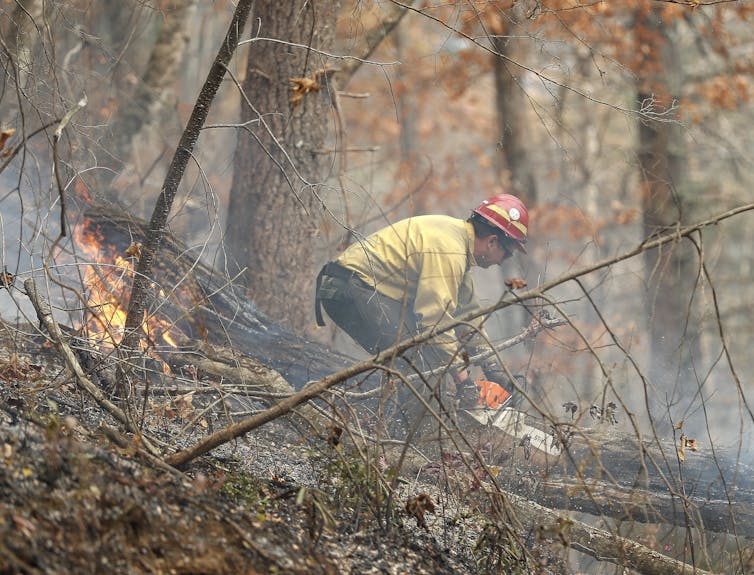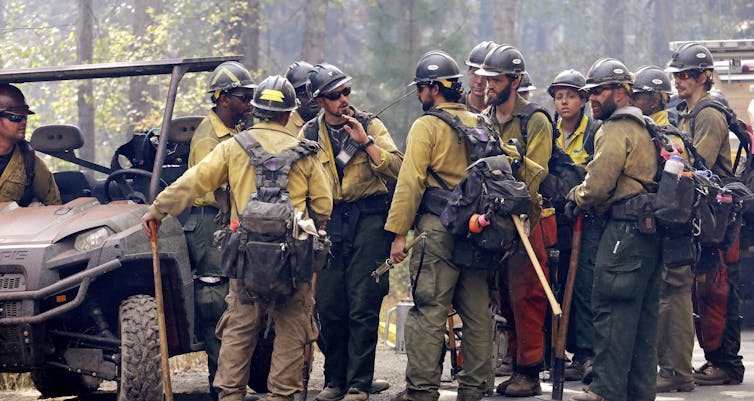As cool climate arrives and the variety of U.S. wildfires declines, wildland firefighters who’ve spent months working within the warmth and smoke are capable of take a much-needed break. However for a lot of of them, the stress of the job isn’t going away.
Continued uncertainty relating to federal pay and advantages, coupled with psychological well being dangers and seasonal monetary pressure, make this a precarious time for wildland firefighters.
I examine the environmental and occupational well being of wildland firefighters as a professor. I’m additionally married to a wildland firefighter, and we’ve two kids. His work is unpredictable and harmful. For him and lots of wildland firefighters like him, the stress is compounded by the uncertainty surrounding the way forward for wildland firefighter pay.
In 2021, Congress accredited a brief retention bonus of US$20,000 a 12 months or 50% of the firefighter’s base pay, whichever quantity was smaller. Nonetheless, wildland firefighters are nonetheless ready for that increase to be codified three years later.
Firefighting is a harmful occupation, but beginning pay is as little as $15 an hour.
AP Picture/Jae C. Hong
Because of this hundreds of households live in a continuing state of monetary insecurity throughout the nation. If that pay increase expires, many firefighters will lose massive percentages of their revenue. For a lot of, these aren’t high-paying jobs. The beginning pay is as little as $15 per hour.
The federal persevering with decision that has been protecting the federal government operational – and the pay improve quickly in place – is ready to run out on Dec. 20, 2024. Congress is prone to lengthen it yet one more time. But when the brand new finances Congress finally passes fails to handle wildland firefighter pay, firefighters face a significant monetary setback.
With seasonal contracts wrapping up, many wildland firefighters are at a crossroads.
Surveys replicate psychological and bodily well being pressure
In 2022 and 2023, my analysis group and I performed national-scale surveys of wildland firefighters and the dispatchers who work with them. We needed to know how the excessive well being threat elements, work-life steadiness and morale have an effect on their well-being and future within the discipline.
Working in wildland firefighting is an unpredictable and infrequently emotionally difficult job. Wildland firefighters work in tight-knit crews that rely upon each other for bodily security, and they’re the front-line protection for houses and communities threatened by hearth. On common, about 17 U.S. wildland firefighters are killed within the line of responsibility every year.
Wildland firefighters and wildland hearth dispatchers report widespread struggles with psychological well being, together with excessive charges of melancholy, anxiousness, post-traumatic stress dysfunction and suicidal ideas or ideations.
One in three wildland hearth dispatchers mentioned they’d had suicidal ideas or ideations, and half know a wildland firefighter who has died by suicide.
Pay insurance policies encourage overwork, dangerous selections
The federal wildland hearth system additionally incentivizes overworking and dangerous behaviors that put firefighters at higher threat of bodily hurt.
With beginning pay so low, many wildland firefighters find yourself working a mean of over 600 hours of time beyond regulation yearly to pay their payments. That is the equal of working 15 further 40-hour weeks per 12 months.
A typical wildland hearth deployment lasts 14 consecutive days, averaging 16 hours per day. Usually, they sleep in rugged situations, in tents and on the bottom.

To do the job safely, wildland firefighters should pay attention to their environment always, and so they should be capable to depend on their tools.
AP Picture/John Bazemore
Additional, there’s incentive pay for working in hazardous situations. Because of this, as a deployment progresses, wildland firefighters are working extra harmful jobs, extra hours and are more and more bodily and mentally exhausted, leaving them susceptible to pricey errors that would impede their security.
Our research have discovered that 67% of wildland firefighters have been injured or had an sickness associated to their work. Smoke inhalation, dwelling in shut quarters and the day by day bodily stress can all create well being dangers. Moreover, over three-quarters of the respondents report unsafe working situations, starting from substandard housing to tools failures to violent interpersonal interactions.
These points want long-term proactive options, however presently few exist. The U.S. Forest Service affords psychological well being counseling, however till 2023, momentary seasonal staff, together with over one-third of wildland firefighters, weren’t eligible for federal well being advantages.
Federal hiring system provides extra stress
A profession in wildland firefighting could be a powerful promote – lengthy hours, months away from house, grueling bodily labor, well being and security hazards, and low beginning pay.
Surveys of wildland firefighters’ spouses and companions discovered excessive ranges of household battle and poor work-life steadiness. Most wildland firefighters mentioned that they have been unable to attend necessary household and life occasions throughout hearth season, and most wildland hearth dispatchers reported that they didn’t spend satisfactory time open air or with household.
Wildland firefighters mentioned that they love the problem of the job, and so they felt like their work makes a distinction. Crews should depend on each other for his or her security, and this builds deep bonds and loyalty to their group.
Given the necessity for extra firefighters and the extreme calls for of the job, it might come as a shock that one of many prime obstacles wildland firefighters report dealing with is efficiently navigating the gauntlet of federal hiring.

A crew chief, heart left, talks to his firefighters about their plans to assault a hearth burning close by on Aug. 20, 2015, in Twisp, Wash., a day after three firefighters have been killed combating a wildfire close to the city.
AP Picture/Elaine Thompson
Many federal firefighters are momentary seasonal staff, so they should reapply for positions yearly. Even for full-time staff, profession development incessantly requires transferring amongst completely different positions or areas to build up expertise essential for promotions.
Tales of monthslong delays in begin dates should not unusual: One firefighter we spoke with had obtained a job supply in November however didn’t begin the place till Could of the next 12 months. At no level throughout this six- to seven-month window did he have a transparent indication of when he would begin and was persistently advised it might be “soon.” This job paid roughly $38,000 per 12 months.
What Congress can do to retain firefighters
My husband loves his job. He’s happy with the work he does and the distinction he makes by defending lives and communities from wildfires. Nonetheless, the dangers to his well being and well-being, the low pay and the pervasive traumatic uncertainty of the way forward for the career imply that exploring options is a necessity.
Over the previous three years, 45% of the U.S. Forest Service’s wildland firefighting workforce has stop, one thing my analysis group sounded the warning bell on in 2022. That lack of expertise issues.
Retaining skilled firefighters amid longer and worsening hearth seasons would require policymakers to enhance well being care, pay and the organizational construction itself, together with how firefighters are employed and retained. But, the federal authorities continues to delay taking motion, leaving our nation’s fire-prone communities and wildland firefighters in a precarious and unsure place.



